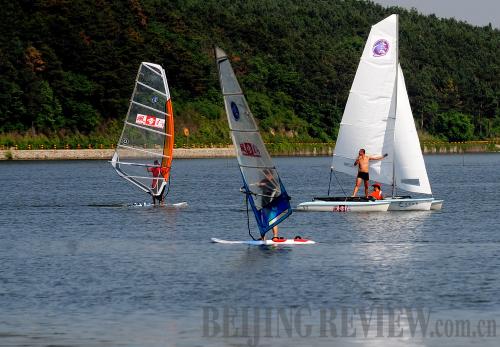|
 |
|
BEING COOL: Some residents in Changchun, northeast China's Jilin Province, go sailing to escape the heat of summer (XU JIAJUN) |
Recently, Zhao Zhixin, a Beijing-based instructor on scientific bodybuilding and public sport, was interviewed by China Youth Daily, sharing his views on how to get healthy scientifically. Edited excerpts follow:
China Youth Daily: What do you think about food therapy as a regimen?
Zhao Zhixin: Food is the easiest understood by average people and it is the easiest to implement in daily life. But the real function of food is sustaining life rather than turning the body from one condition to another instantly.
Among regimens, such as food therapy or sport exercise, we shouldn't talk about one being better and another being worse, nor mention replacing one with another. We should combine the concept of food and exercise with the concept of a regimen from traditional Chinese medicine.
Can we prevent occupational diseases?
Everyone's health can be compared to a bank account. If you always overdraw it and never invest, you will become bankrupt one day. Young people should always keep in mind storing "money" in that bank, or you will become bankrupt if anything major happens.
Some occupations have a higher rate for causing occupational diseases and even bring about death from overwork. It has a lot to do with the condition of people's health banks. In fact, overwork does not necessarily cause diseases or death. It's the irrational lifestyles that bring about our bodies' failure to tackle special conditions. Many internal organs have a fixed capacity, and even if they work very well currently, they will collapse over a certain period.
What are the potential threats that are easily ignored by people today?
There are three notable enemies threatening people's health: environmental pollution, lifestyle changes, and change of diet structure. Some "pollution" we consider harmless but is actually poisonous to our insides, such as alcohol. If you drink each day, your liver will cure the poison each day. If you live by staying up late, taking medicine and consuming food additives, your liver will become more and more fragile day by day.
Many functions of the body degenerate. Let's put it this way, if you keep a finger straight all the time, after a year you will fail to move it at all. When you stop using them, joints degenerate, and the process is irreversible. Besides joints, blood vessels and nerves degenerate if they are never used. Nowadays, many people complain their bodies are not as good as they used to be. That's because they sit too much and don't do enough exercise.
You can hardly tell the difference between people who love exercising and who don't when they are both young. But once the body gets old, you can easily tell the difference. The bodies of people who love exercising are in a better condition. Otherwise, people face functional degeneration in their joints, muscles and so on. Organs are connected inside human bodies. The degeneration of muscles causes the degeneration of many other organs.
Some youth now advocate a healthy way of life and identify themselves as "the green collar" and "the LOHAS group." What do you think about this?
They are awakening, but the proportion is still too small. I had given speeches on health in many universities, and all the speeches were attended by a full house of students. Most of the students had never taken in the health knowledge and their health education had been almost zero.
Nowadays, many youth advocate a healthy way of life. If you go on the Internet, you can see their ardent discussions on health. Their main source of health information is the Internet. But the Internet hardly offers them comprehensive information.
There is various information about regimens on the internet, but much of it is incorrect. Most health editors of websites either lack the knowledge or still rely on outmoded knowledge. I think experts on regimens should better utilize the Internet so as to arouse young people's interest in regimens and health and popularize useful knowledge about scientific care of the body.
Do you have any specific suggestions for young people?
From my point of view, young people should do outdoors sport as often as they can, like running and swimming. They should also have an appropriate amount of anaerobic exercise and store up a capacity for stamina. Young people can try exercising during hot summer afternoons taking cold-water baths in winter, which can improve their ability of adjusting themselves to new environments by deriving stimulus from extraordinary weather. Nowadays, some young people always stay in a comfortable environment. Once the environment changes, they can't get used to it.
Youth should also have good habits of work and rest, especially avoiding staying up late. It is wrong if you think, "I'm so healthy now. It's a piece of cake for me to stay up late." The fact is, by the time you find you can't stay up late any longer, you have already done huge damage to your body. | 